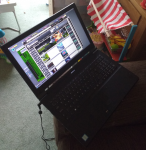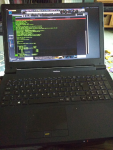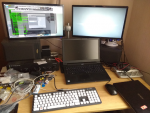sfgreenwood
New member
This is my first PC Specialist machine after a lot of browsing. A bit of background - I'm a fairly heavy duty user, working from home so the machine can be in use for 50-60 hours a week. I run Linux exclusively so didn't need a Windows licence and alternate between the sofa and my home office. Previously I had two machines but it occurred to me that one with a docking station would do the job.
I have tended to prefer smaller machines for years with my last being a 14" Asus Ultrabook which has basically fallen to bits over two and half years, so I wanted something that I could get longer use out of (it's got be at least three years now). I had a look at pretty much everything on the PC Specialist site and while the Voyager doesn't seem to be a common choice it stood out as the machine that would fit my requirements.
Here's the spec:
Chassis & Display Voyager Series: 15.6" Matte Full HD LED Widescreen (1920x1080)
Docking Station DS200 Docking Station: 4 x USB 3.0, DVI-D, HDMI, VGA, RJ45, RS232, MIC, HP
Processor (CPU) Intel® Core™i7 Quad Core Processor i7-6700T (2.8GHz) 8MB Cache
Memory (RAM) 16GB Kingston SODIMM DDR3 1600MHz (2 x 8GB)
Graphics Card INTEL® HD GRAPHICS 530 - 1.7GB Max DDR3 Video RAM - DirectX® 12
2nd Graphics Card NONE
Memory - Hard Disk 480GB KINGSTON UV400 2.5" SSD, SATA 6 Gb (550MB/R, 500MB/W)
2nd Hard Disk NONE
M.2 SSD Drive 128GB M.2 2280, SATA 6Gb/s (534MB/R, 150MB/W)
DVD/BLU-RAY Drive 2nd/3rd HDD HARD DRIVE OPTICAL BAY CADDY (9.5mm)
External DVD/BLU-RAY Drive NONE
Memory Card Reader Integrated 6 in 1 Card Reader (SD /Mini SD/ SDHC / SDXC / MMC / RSMMC)
Thermal Paste ARCTIC MX-4 EXTREME THERMAL CONDUCTIVITY COMPOUND
Sound Card Intel 2 Channel High Definition Audio + MIC/Headphone Jack
Bluetooth & Wireless GIGABIT LAN & WIRELESS INTEL® AC-8260 M.2 (867Mbps, 802.11AC) + BLUETOOTH
Wireless Router/HomePlugs/Range Extenders NONE
USB Options 3 x USB 3.0 PORTS + 1 x USB 2.0 PORT AS STANDARD
3G/4G Module NONE
Battery Voyager Series 6 Cell Lithium Ion Battery (62WH)
Power Lead & Adaptor 1 x UK Power Lead & 65W AC Adaptor
Keyboard Language VOYAGER SERIES BACKLIT UK KEYBOARD WITH NUMBER PAD
Operating System NO OPERATING SYSTEM REQUIRED
Operating System Language United Kingdom - English Language
DVD Recovery Media NO DVD RECOVERY MEDIA REQUIRED
Office Software NO OFFICE SOFTWARE
Anti-Virus NO ANTI-VIRUS SOFTWARE
Browser Google Chrome™
Carry Case NONE
Laptop Cooling Stands NONE
Wireless Display Adapter NONE
Stand-Alone Monitor NONE
Additional Keyboard NONE
Notebook Mouse INTEGRATED 2 BUTTON TOUCHPAD MOUSE
Gaming Mouse Pad NONE
Game Streaming NONE
Games Controller NONE
External Speakers NONE
Webcam INTEGRATED 1MP HD WEBCAM
Headsets NONE
Surge Protection NONE
Printer NONE
External Hard Drive NONE
Warranty 3 Year Standard Warranty (1 Month Collect & Return, 1 Year Parts, 3 Year Labour)
Home Installation NONE
Dead Pixel Guarantee 30 Day Dead Pixel Guarantee Inc. Labour & Carriage Costs
Insurance NONE
Delivery STANDARD INSURED DELIVERY TO UK MAINLAND (MON-FRI)
Build Time Standard Build - Approximately 5 to 7 working days
Delivery was on the next Friday after the Thursday that I ordered it (well, it only came from Wakefield).
I booted it up to test and check for dead pixels and the like and all seemed good, so I booted to a live USB of Manjaro Linux. If you don't know it, it's an Arch desktop variant which is pretty lightweight out of the box and has a rolling update schedule. I use it on my travelling machine, as I was told that it had better battery life on Lenovo machines. However, on this machine the keyboard and touchpad didn't work out of the box, which makes things a touch hard to configure, so I downloaded Xubuntu 16.04.1, which worked straight away.
Installation to the M2 SSD was ridiculously fast, 10-15 minutes, and after a bit of cosmetic twiddling to make sure I had the tool I needed I was ready to go.

(in its natural environment, small girl child out of view)
Only small issues have been the incomplete support for Skylake processors - there doesn't seem to be a way to get battery life for example. In Ubuntu the complete support which is due in Linux kernel 4.6 has been backported into the 4.4 kernel that comes with 16.04 but it doesn't seem to be all there and as it's fairly new there aren't the resources available for ACPI and DBUS support as yet.
The fan is a little bit whiny but then again the Asus Ultrabook scarcely made any noise at all so I've been a bit spoilt.
The machine looks great, ThinkPad-like styling in matt rubber, heavy but not enormously so - with no spinning disks and DVD it shouldn't be. Keyboard is good and has a nice positive feel. It's a bit off centre from what I'm used to and I keep hitting 1 when I want the up key but that's me.
Battery life is good - well, it's better than my Asus, which didn't work at all, but I've had it off power for three hours so so far, but as I don't have any reporting I don't know what life I should expect.
Suspend sort of works but has problems, but this seems to be common to Ubuntu with Intel graphics cards and there is a fix available.

Also its natural environment, keeping my knees warm
I got the docking station set up in my home office eventually , replacing an Acer Revo, and was impressed that it pretty much works out of the box. Keyboard and mouse worked immediately and the dual Acer displays were detected straight away. It's a manual job to switch to them but there will be ways to handle that. Sound was the only problem I encountered here as I have a pair of QSB Sound Science cubes plugged into the station, but installing gstreamer 1.0 brought them to life.

Dual screens enabled - the laptop will also work as another desktop, which is pretty damned cool.
Things I haven't really looked into: the fingerprint reader registers fingerprints on the pad but the Gnome fingerprint GUI doesn't seem to want to do anything with them, and while TPM is supposed to work I haven't looked into it. I'd consider two factor authentication for it if I travelled with it anyway.
In terms of actual performance it's hard to say - it's probably much more of a machine than I need for everyday use but I have the option to run virtual machines for development on it if I want to, which may come in handy. It's probably not reaching its potential yet so I will see when kernel 4.6 is the mainline and there is better support for the series 6 CPUs. On the whole as long as its screws stay in and I'm not looking for a new machine again in two years time I'll be very happy with it.
I have tended to prefer smaller machines for years with my last being a 14" Asus Ultrabook which has basically fallen to bits over two and half years, so I wanted something that I could get longer use out of (it's got be at least three years now). I had a look at pretty much everything on the PC Specialist site and while the Voyager doesn't seem to be a common choice it stood out as the machine that would fit my requirements.
Here's the spec:
Chassis & Display Voyager Series: 15.6" Matte Full HD LED Widescreen (1920x1080)
Docking Station DS200 Docking Station: 4 x USB 3.0, DVI-D, HDMI, VGA, RJ45, RS232, MIC, HP
Processor (CPU) Intel® Core™i7 Quad Core Processor i7-6700T (2.8GHz) 8MB Cache
Memory (RAM) 16GB Kingston SODIMM DDR3 1600MHz (2 x 8GB)
Graphics Card INTEL® HD GRAPHICS 530 - 1.7GB Max DDR3 Video RAM - DirectX® 12
2nd Graphics Card NONE
Memory - Hard Disk 480GB KINGSTON UV400 2.5" SSD, SATA 6 Gb (550MB/R, 500MB/W)
2nd Hard Disk NONE
M.2 SSD Drive 128GB M.2 2280, SATA 6Gb/s (534MB/R, 150MB/W)
DVD/BLU-RAY Drive 2nd/3rd HDD HARD DRIVE OPTICAL BAY CADDY (9.5mm)
External DVD/BLU-RAY Drive NONE
Memory Card Reader Integrated 6 in 1 Card Reader (SD /Mini SD/ SDHC / SDXC / MMC / RSMMC)
Thermal Paste ARCTIC MX-4 EXTREME THERMAL CONDUCTIVITY COMPOUND
Sound Card Intel 2 Channel High Definition Audio + MIC/Headphone Jack
Bluetooth & Wireless GIGABIT LAN & WIRELESS INTEL® AC-8260 M.2 (867Mbps, 802.11AC) + BLUETOOTH
Wireless Router/HomePlugs/Range Extenders NONE
USB Options 3 x USB 3.0 PORTS + 1 x USB 2.0 PORT AS STANDARD
3G/4G Module NONE
Battery Voyager Series 6 Cell Lithium Ion Battery (62WH)
Power Lead & Adaptor 1 x UK Power Lead & 65W AC Adaptor
Keyboard Language VOYAGER SERIES BACKLIT UK KEYBOARD WITH NUMBER PAD
Operating System NO OPERATING SYSTEM REQUIRED
Operating System Language United Kingdom - English Language
DVD Recovery Media NO DVD RECOVERY MEDIA REQUIRED
Office Software NO OFFICE SOFTWARE
Anti-Virus NO ANTI-VIRUS SOFTWARE
Browser Google Chrome™
Carry Case NONE
Laptop Cooling Stands NONE
Wireless Display Adapter NONE
Stand-Alone Monitor NONE
Additional Keyboard NONE
Notebook Mouse INTEGRATED 2 BUTTON TOUCHPAD MOUSE
Gaming Mouse Pad NONE
Game Streaming NONE
Games Controller NONE
External Speakers NONE
Webcam INTEGRATED 1MP HD WEBCAM
Headsets NONE
Surge Protection NONE
Printer NONE
External Hard Drive NONE
Warranty 3 Year Standard Warranty (1 Month Collect & Return, 1 Year Parts, 3 Year Labour)
Home Installation NONE
Dead Pixel Guarantee 30 Day Dead Pixel Guarantee Inc. Labour & Carriage Costs
Insurance NONE
Delivery STANDARD INSURED DELIVERY TO UK MAINLAND (MON-FRI)
Build Time Standard Build - Approximately 5 to 7 working days
Delivery was on the next Friday after the Thursday that I ordered it (well, it only came from Wakefield).
I booted it up to test and check for dead pixels and the like and all seemed good, so I booted to a live USB of Manjaro Linux. If you don't know it, it's an Arch desktop variant which is pretty lightweight out of the box and has a rolling update schedule. I use it on my travelling machine, as I was told that it had better battery life on Lenovo machines. However, on this machine the keyboard and touchpad didn't work out of the box, which makes things a touch hard to configure, so I downloaded Xubuntu 16.04.1, which worked straight away.
Installation to the M2 SSD was ridiculously fast, 10-15 minutes, and after a bit of cosmetic twiddling to make sure I had the tool I needed I was ready to go.

(in its natural environment, small girl child out of view)
Only small issues have been the incomplete support for Skylake processors - there doesn't seem to be a way to get battery life for example. In Ubuntu the complete support which is due in Linux kernel 4.6 has been backported into the 4.4 kernel that comes with 16.04 but it doesn't seem to be all there and as it's fairly new there aren't the resources available for ACPI and DBUS support as yet.
The fan is a little bit whiny but then again the Asus Ultrabook scarcely made any noise at all so I've been a bit spoilt.
The machine looks great, ThinkPad-like styling in matt rubber, heavy but not enormously so - with no spinning disks and DVD it shouldn't be. Keyboard is good and has a nice positive feel. It's a bit off centre from what I'm used to and I keep hitting 1 when I want the up key but that's me.
Battery life is good - well, it's better than my Asus, which didn't work at all, but I've had it off power for three hours so so far, but as I don't have any reporting I don't know what life I should expect.
Suspend sort of works but has problems, but this seems to be common to Ubuntu with Intel graphics cards and there is a fix available.

Also its natural environment, keeping my knees warm
I got the docking station set up in my home office eventually , replacing an Acer Revo, and was impressed that it pretty much works out of the box. Keyboard and mouse worked immediately and the dual Acer displays were detected straight away. It's a manual job to switch to them but there will be ways to handle that. Sound was the only problem I encountered here as I have a pair of QSB Sound Science cubes plugged into the station, but installing gstreamer 1.0 brought them to life.

Dual screens enabled - the laptop will also work as another desktop, which is pretty damned cool.
Things I haven't really looked into: the fingerprint reader registers fingerprints on the pad but the Gnome fingerprint GUI doesn't seem to want to do anything with them, and while TPM is supposed to work I haven't looked into it. I'd consider two factor authentication for it if I travelled with it anyway.
In terms of actual performance it's hard to say - it's probably much more of a machine than I need for everyday use but I have the option to run virtual machines for development on it if I want to, which may come in handy. It's probably not reaching its potential yet so I will see when kernel 4.6 is the mainline and there is better support for the series 6 CPUs. On the whole as long as its screws stay in and I'm not looking for a new machine again in two years time I'll be very happy with it.
Last edited:
